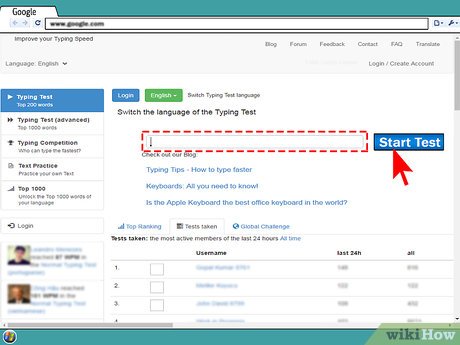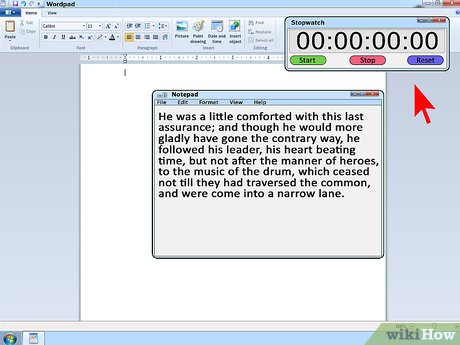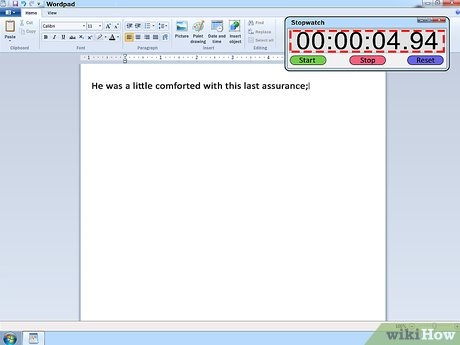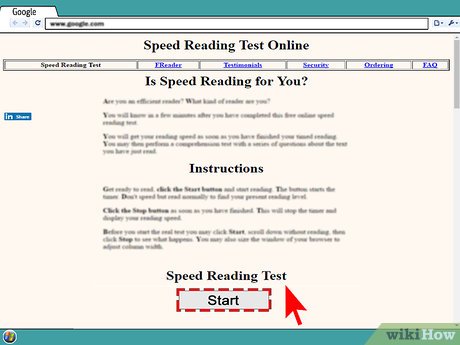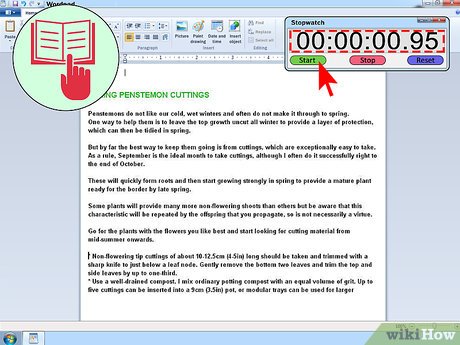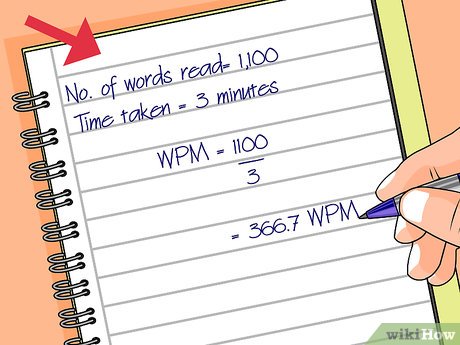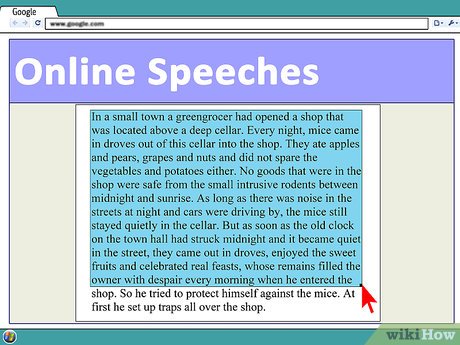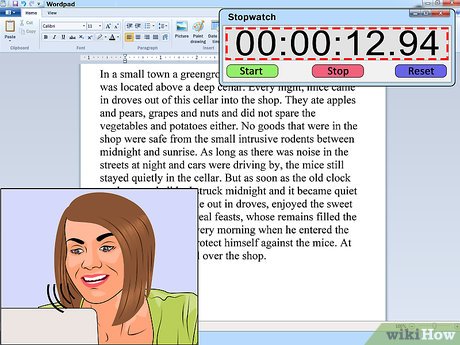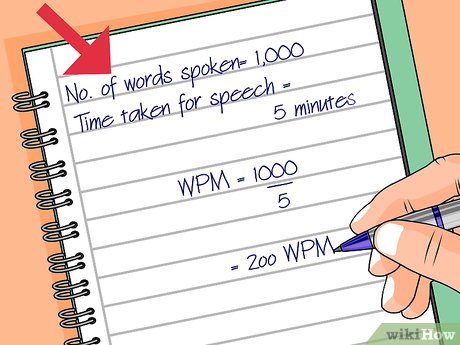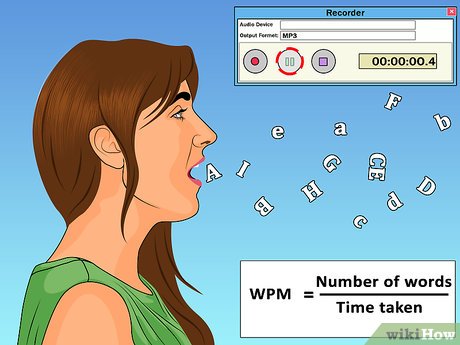How to Calculate Words Per Minute
Method 1 of 3:
Finding Words Typed Per Minute
-
 For the quickest results, use an online typing tester. Today, the easiest way to figure out how many words you can type per minute is usually to use a program online specifically made to test this. It's easy to find dozens of these programs with a search engine term like "words per minute typing test." Though there are many of these types of programs available, most work the same way: you type a list of words within a certain time limit and the program uses your performance to calculate your WPM.
For the quickest results, use an online typing tester. Today, the easiest way to figure out how many words you can type per minute is usually to use a program online specifically made to test this. It's easy to find dozens of these programs with a search engine term like "words per minute typing test." Though there are many of these types of programs available, most work the same way: you type a list of words within a certain time limit and the program uses your performance to calculate your WPM.- One great program for this is available at 10fastfingers.com.[1] The test on this page is simple: just type each word on the screen, putting a space between each, until the minute timer counts down.
- In addition to learning your WPM, this typing test will also tell you the number of mistakes you made and tell you which percentage of test-takers you scored in.
-
 Alternatively, open a word processor and set a timer. You can also determine your typed WPM manually — for this, you'll need a computer program you can type in (like a word processor or notepad program), a timer or stopwatch, and a source of text you can copy.
Alternatively, open a word processor and set a timer. You can also determine your typed WPM manually — for this, you'll need a computer program you can type in (like a word processor or notepad program), a timer or stopwatch, and a source of text you can copy.- Set the timer for any length of time (in general, the longer you test yourself for, the less vulnerable you'll be to fluke performances.)
- Your text should be long enough that you won't reach the end before your timer finishes.
- If you don't have a word processor installed on your device, you can access one for free with a Google account at drive.google.com.[2]
-
 Start the timer and start typing. When you're all ready to go, start the timer, then begin copying the text. Try to be as accurate as you can — if you notice a mistake while you're typing a word, fix it, but you don't need to fix mistakes in words that you've already finished. Keep copying the text until the timer goes off, then stop immediately.
Start the timer and start typing. When you're all ready to go, start the timer, then begin copying the text. Try to be as accurate as you can — if you notice a mistake while you're typing a word, fix it, but you don't need to fix mistakes in words that you've already finished. Keep copying the text until the timer goes off, then stop immediately. -
 Divide the number of words by the number of minutes. Now, finding your WPM is easy. Divide the number of words you typed by the number of minutes that you originally set your timer for. The final answer you get is your WPM.
Divide the number of words by the number of minutes. Now, finding your WPM is easy. Divide the number of words you typed by the number of minutes that you originally set your timer for. The final answer you get is your WPM.- Note that nearly all modern word processors have a "word count" feature, so you don't need to count your words manually.
- For example, let's say that we type 102 words in 1 minute and 30 seconds. To find our WPM, we would divide 102 words/1.5 minutes to get 68 WPM.
Method 2 of 3:
Finding Words Read Per Minute
-
 Use an online test. If you're trying to figure out how many words per minute you can read, once again, your best bet is generally to use an online speed reading test program. These are a little less common than typing speed tests but plenty of good ones can still be found with search engine queries like "reading words per minute."
Use an online test. If you're trying to figure out how many words per minute you can read, once again, your best bet is generally to use an online speed reading test program. These are a little less common than typing speed tests but plenty of good ones can still be found with search engine queries like "reading words per minute."- One great program is available at readingsoft.com.[3] In this program, you time yourself while you read a text of predetermined length. Once you finish, the program calculates your WPM based on how quickly you reached the end.
-
 Alternatively, grab a stopwatch and copy a long stretch of text into a word processor. As above, it's also possible to find the WPM you read manually. To do this, you'll want to open a word processor, paste a page or two of text into it (preferably something you haven't read before), then get ready to start a stopwatch.
Alternatively, grab a stopwatch and copy a long stretch of text into a word processor. As above, it's also possible to find the WPM you read manually. To do this, you'll want to open a word processor, paste a page or two of text into it (preferably something you haven't read before), then get ready to start a stopwatch.- Before you begin, use your word processor's "word count" feature to determine how many words are in your text selection. Record this number — you'll need it at the end.
- A good place to find long text selections you haven't read before is on your favorite news website. Since the news is constantly updated, you won't have to wait long to find something you haven't read yet.
-
 Start the stopwatch and start reading. When you're ready, start timing yourself and begin reading the text at your normal reading speed. Unless you're specifically trying to see your maximum reading speed, you shouldn't rush yourself — this won't give you an accurate picture of how fast you read in your day-to-day life.
Start the stopwatch and start reading. When you're ready, start timing yourself and begin reading the text at your normal reading speed. Unless you're specifically trying to see your maximum reading speed, you shouldn't rush yourself — this won't give you an accurate picture of how fast you read in your day-to-day life. -
 Divide the number of words by the time it took you to read the text. Stop the stopwatch as soon as you read the very last word in the text. Now, just use the same formula as above to find your WPM: # words/# minutes.
Divide the number of words by the time it took you to read the text. Stop the stopwatch as soon as you read the very last word in the text. Now, just use the same formula as above to find your WPM: # words/# minutes.- For example, if it took us three minutes to read a 1,100-word news article, we would find our WPM by dividing 1,100/3 = 366.7 WPM.
Method 3 of 3:
Finding Words Spoken Per Minute
-
 Grab a stopwatch and find a speech with a known number of words. Figuring out your WPM while speaking is a little more difficult than the two methods above. Most noticeably, there aren't any good online programs that can make the calculations for you. However, with a little effort, you can still find your speaking WPM manually. Start by copying a speech (preferably a reasonably short one that you haven't read before) into your word processor, then finding the number of words in it with the processor's "word count" feature. You'll also need a stopwatch for this test.
Grab a stopwatch and find a speech with a known number of words. Figuring out your WPM while speaking is a little more difficult than the two methods above. Most noticeably, there aren't any good online programs that can make the calculations for you. However, with a little effort, you can still find your speaking WPM manually. Start by copying a speech (preferably a reasonably short one that you haven't read before) into your word processor, then finding the number of words in it with the processor's "word count" feature. You'll also need a stopwatch for this test.- A list of major historical speeches is available at historyplace.com.[4] Many of these speeches (like, for instance, George Graham Vest's "Tribute to the Dog") aren't well-known by the general public, making them great for this test.
-
 Time yourself as you deliver the speech. Start the stopwatch and begin reading the text out loud. Talk at your normal speaking rate — again, unless you're trying to figure out your maximum speaking rate, going quickly has no purpose. Speak with a moderate, conversational pace, pausing whenever feels natural.
Time yourself as you deliver the speech. Start the stopwatch and begin reading the text out loud. Talk at your normal speaking rate — again, unless you're trying to figure out your maximum speaking rate, going quickly has no purpose. Speak with a moderate, conversational pace, pausing whenever feels natural. -
 Divide the number of words in the speech by the minutes it took to deliver. When you finish the speech, stop the stopwatch. Once again, your WPM is given by dividing the number of words in the speech by the number of minutes it took for you to speak it.
Divide the number of words in the speech by the minutes it took to deliver. When you finish the speech, stop the stopwatch. Once again, your WPM is given by dividing the number of words in the speech by the number of minutes it took for you to speak it.- For example, if it took us five minutes to deliver a 1,000-word speech, we would find our WPM by dividing 1,000/5 = 200 WPM.
-
 Use a recording of a natural conversation for a more accurate WPM. The test above is alright for determining your WPM, but it's not perfectly accurate. The way we speak when delivering a speech is a little different than the way we speak when we're actually talking in our day-to-day life — many people, for instance, deliberately talk more slowly and clearly when reading aloud. In addition, since you're reading from a written text, the test is also partly a test of your reading speed and not your natural speaking speed.
Use a recording of a natural conversation for a more accurate WPM. The test above is alright for determining your WPM, but it's not perfectly accurate. The way we speak when delivering a speech is a little different than the way we speak when we're actually talking in our day-to-day life — many people, for instance, deliberately talk more slowly and clearly when reading aloud. In addition, since you're reading from a written text, the test is also partly a test of your reading speed and not your natural speaking speed.- To get the most accurate results, you'll want to record yourself speaking to someone else in a semi-casual setting for a long, uninterrupted stretch of time, count the words manually, and divide by the number of words by the number of minutes. This is fairly painstaking, but it's the most accurate measure of your actual speaking speed.
- One good way to get yourself talking for a long stretch of time is to gather a group of friends and tell them a long, detailed story that you know well and have told before. This way, you won't need to pause to remember how the story goes — you'll only be limited by your natural speaking speed.
Share by
Lesley Montoya
Update 24 March 2020
